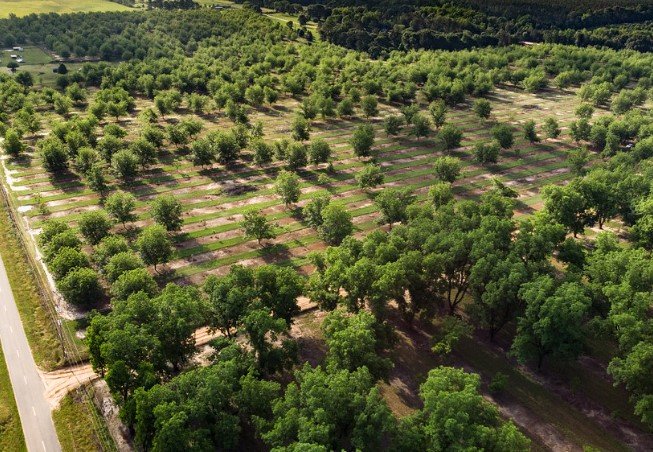Hurricane Helene has brought a brutal blow to Georgia’s pecan industry, impacting nearly 50,000 acres of pecan trees. For many farmers, including Taylor and Arren Moses, the losses are profound, wiping out years of dedication and investment.
Pecan Harvest Crushed by Hurricane Helene’s Path
When Hurricane Helene struck Georgia on September 26, its powerful winds and rains tore through the state’s pecan orchards, taking with it a third of the annual pecan harvest—an estimated 36 million pounds of pecans. According to the University of Georgia, Georgia’s farmers suffered an enormous hit, with the economic damage from the hurricane expected to top $6.46 billion across various agricultural sectors.
The destruction was staggering for farmers like Taylor Moses, who lost all her family’s nut-producing trees overnight. “We knew we were facing some damage,” she said, “but to see everything gone… it was heartbreaking.” For the Moses family and others, pecan trees are more than a crop; they’re a symbol of generational labor and dedication, now lost in a single storm.
Old Pecan Trees, Centuries of Investment, Destroyed
The toll of Hurricane Helene extends beyond this year’s harvest. Large pecan trees, some over 100 years old, were uprooted and destroyed. According to Lenny Wells, a University of Georgia horticulture professor and pecan specialist, nearly 70% of Georgia’s older pecan trees were decimated in the hurricane.
“I thought Hurricane Michael in 2018 was the worst storm I’d ever see,” Wells commented. “But Helene’s impact might be even worse.” In 2018, Hurricane Michael caused $2 billion in agricultural damage across Georgia. Six years later, Helene has devastated what was left of those orchards.

Pecan trees take at least a decade to yield profitable crops, which makes rebuilding efforts a daunting prospect for farmers who have lost century-old trees. Georgia Commissioner of Agriculture Tyler Harper noted the generational impact, with some families losing trees planted by their grandparents. “It takes decades to rebuild that kind of investment,” he said.
Small Producers, Big Losses
For small and family-owned farms, the stakes are especially high. Chris Harrell, CEO of Southern Roots Nuts Company in Georgia, has witnessed the distress among farmers firsthand. Harrell’s co-operative, which consists of 16 pecan farmers, saw five of its members lose their entire crop.
“It’s demoralizing,” Harrell shared. “Many farmers were already stretched thin with rising production costs. Now, they’re looking at even tighter margins and the prospect of years without revenue.”
Georgia’s pecan industry was already grappling with trade tariffs, labor shortages, and low consumer prices. The hurricane added another layer of difficulty to an already challenging economic climate. As a result, farmers are concerned about the future of their operations, with some considering whether they can afford to replant at all.
Shortages and Rising Prices on the Horizon
With the widespread destruction of pecan orchards, experts predict a short-term shortage of pecans and possible price increases. Harrell explained that the Southern Roots co-op is already feeling the squeeze: “We’re unsure if we have enough supply to meet demand. We’re looking at potential price increases in the short term.”
The shortfall in Georgia’s pecan production could have ripple effects across the country. Other states, like New Mexico, also grow pecans, but their supply may not be enough to make up for Georgia’s losses. Brad Rubin from Wells Fargo’s Agri-Food Institute pointed out that while current demand may not immediately cause major price swings, pecan prices could rise over the next few years as supply struggles to catch up with demand.
Companies that rely on pecans are already bracing for higher prices. PKN, a pecan-based milk company, has already factored in price increases for the upcoming holiday season. CEO Laura Shenkar noted that with pecans as a crucial ingredient in popular items like pecan pie and butter pecan ice cream, consumers may see price hikes over time.
A Hard Decision for Farmers: To Replant or Not?
For many Georgia pecan farmers, rebuilding isn’t a straightforward choice. Replanting trees means committing to years of labor with no immediate return. Taylor Moses, who lost her entire crop, described the tough conversations she and her husband have had about whether to replant their orchard. “We’d hoped to pass the trees on to our son,” she said. But with a three-year-old at home and a blank slate of land, the future feels uncertain.
There’s a growing sense of urgency among these farmers, many of whom are facing losses not just financially but emotionally, too. For those who choose to replant, the road to recovery is long, costly, and emotionally demanding.
